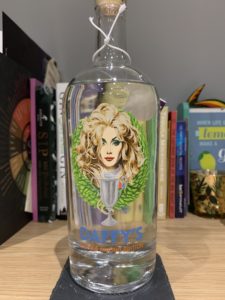 If you know your gin, you should have heard of Daffy’s gin – I actually reviewed it at the end of 2017. Before I had a chance to try their gin, they actually released a limited edition gin (thanks to Gin Foundry’s HQ clear out I got myself a bottle) in partnership with Formula 1’s Manor Racing. Their already striking label gets a jazzy upgrade with a winner’s wreath and trophy, and so does their recipe. They didn’t want to start from scratch, so taking inspiration from their original eight botanicals, this edition features including Lebanese mint and fresh Spanish limes – the goal was to create something fresh and exciting. They produced just 2,500 bottles of this release, and sadly the team it was produced for has since gone into administration. So basically, I’m trying a gin that you can’t buy, that’s four years old, and made for a team that don’t exist. Don’t say I don’t keep on top of all the news in the gin world. So, even though you probably can’t try it, I can.
If you know your gin, you should have heard of Daffy’s gin – I actually reviewed it at the end of 2017. Before I had a chance to try their gin, they actually released a limited edition gin (thanks to Gin Foundry’s HQ clear out I got myself a bottle) in partnership with Formula 1’s Manor Racing. Their already striking label gets a jazzy upgrade with a winner’s wreath and trophy, and so does their recipe. They didn’t want to start from scratch, so taking inspiration from their original eight botanicals, this edition features including Lebanese mint and fresh Spanish limes – the goal was to create something fresh and exciting. They produced just 2,500 bottles of this release, and sadly the team it was produced for has since gone into administration. So basically, I’m trying a gin that you can’t buy, that’s four years old, and made for a team that don’t exist. Don’t say I don’t keep on top of all the news in the gin world. So, even though you probably can’t try it, I can.
Botany Bay gin
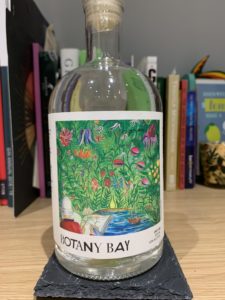 Nearly 18 months ago I was excited to collect the keys to my new home. I was excited because at said new house was a bottle of the Four Pillars x Herno collaboration, Dry Island gin (which, if anyone is interested, is one of my favourites ever). For that gin, the Four Pillars team incorporated some of Herno’s key botanicals into their process. Today, we try Botany Bay, the next release which sees Australian botanicals make their way to Sweden to join Herno’s distillation. Fun story: the first Swede to circumnavigate the world was botanist Dr. Daniel Solander who was so taken with the variety of flora he found down under that he named the landing spot Botany Bay. Inspired by this history, Herno uses their signature botanicals meadowsweet and lingonberry and combines them with Australian wattleseed, Tasmanian pepper berry and lemon myrtle. Before we taste the gin, I think we should just take a moment to appreciate the label which ignores Herno’s simple label tradition and is a bright, colourful picture of Dr Solander’s adventure (Dry Island had a label very in line with Four Pillars’ branding). So, do the contents live up to the label’s (and its predecessor’s) standards?
Nearly 18 months ago I was excited to collect the keys to my new home. I was excited because at said new house was a bottle of the Four Pillars x Herno collaboration, Dry Island gin (which, if anyone is interested, is one of my favourites ever). For that gin, the Four Pillars team incorporated some of Herno’s key botanicals into their process. Today, we try Botany Bay, the next release which sees Australian botanicals make their way to Sweden to join Herno’s distillation. Fun story: the first Swede to circumnavigate the world was botanist Dr. Daniel Solander who was so taken with the variety of flora he found down under that he named the landing spot Botany Bay. Inspired by this history, Herno uses their signature botanicals meadowsweet and lingonberry and combines them with Australian wattleseed, Tasmanian pepper berry and lemon myrtle. Before we taste the gin, I think we should just take a moment to appreciate the label which ignores Herno’s simple label tradition and is a bright, colourful picture of Dr Solander’s adventure (Dry Island had a label very in line with Four Pillars’ branding). So, do the contents live up to the label’s (and its predecessor’s) standards?
Boatyard Double gin
Note: This post contains affiliate links marked as [Ad], if you click on this and buy a bottle of gin then I will receive a small commission.
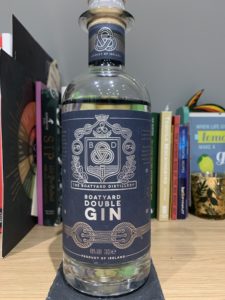
There’s been a lot of talk in the recent months about the rise in Scottish gin, but today we head across the water to the north west coast of Ireland. Boatyard Distillery is based on the banks of Lough Erne in their farm-to-bottle distillery. Their vodka is made from home-grown wheat, the spent grains go back to the land as fertiliser and animal food, and they pick their signature gin botanical (Sweet Gale – a type of bog myrtle) is picked from the family bog. Today’s drink is their flagship Double Gin, made by macerating eight botanicals for 18 hours in their wheat spirit and ensure the juniper flavour is front and centre using a filtration process which helps to highlight the beautiful pine notes. They keep their botanical list fairly traditional – alongside the juniper is coriander, liquorice root, angelica, orris, fresh lemon peel, grains of paradise and the aforementioned Sweet Gale. So, how does the banks of Lough Erne taste?
Gŵyr Rhamanta gin
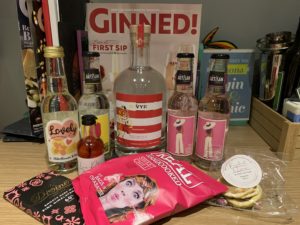 As you’ll probably know if you read my blog, I am a long time member of Craft Gin Club. My next delivery is due in March, but when I saw the announcement that February’s box is an exclusive release from Gŵyr, I had to get myself a box. The newest member of the family is a Valentine’s special featuring their distinct foraged wild fennel alongside pomegranate seeds, red rose petals and fresh pink grapefruit zest. The label may be pink, but the gin isn’t. Rhamanta has two meanings: the first is an old Welsh tradition of divining your romantic future, and the second is the translation “be romantic”. Because what says romance more than shovelling grains of wheat over a fire to see when they pop and then commanding someone to be romantic? Siân and Andrew liked the idea of “romance” counting as the act of sharing your gin with your partner, friends and family – sharing gin love is the best type of romance. Made in their distillery at the bottom of their garden, surrounded by their family (who are the team), over looking the sea, this gin also helps celebrate the couple’s 30th anniversary. Let’s raise a glass to Brooks’ and see how it tastes.
As you’ll probably know if you read my blog, I am a long time member of Craft Gin Club. My next delivery is due in March, but when I saw the announcement that February’s box is an exclusive release from Gŵyr, I had to get myself a box. The newest member of the family is a Valentine’s special featuring their distinct foraged wild fennel alongside pomegranate seeds, red rose petals and fresh pink grapefruit zest. The label may be pink, but the gin isn’t. Rhamanta has two meanings: the first is an old Welsh tradition of divining your romantic future, and the second is the translation “be romantic”. Because what says romance more than shovelling grains of wheat over a fire to see when they pop and then commanding someone to be romantic? Siân and Andrew liked the idea of “romance” counting as the act of sharing your gin with your partner, friends and family – sharing gin love is the best type of romance. Made in their distillery at the bottom of their garden, surrounded by their family (who are the team), over looking the sea, this gin also helps celebrate the couple’s 30th anniversary. Let’s raise a glass to Brooks’ and see how it tastes.
TOAD Oxford Dry gin
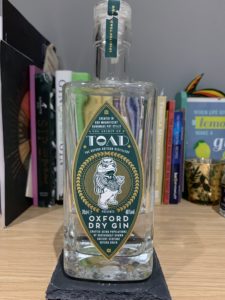 Fun story: my first proper job out of university was working in marketing and events for entrepreneurs and investors. Obviously I then added all my favourite people on LinkedIn. Fast forward a few years and up pops a notification from Tagore Ramoutar saying he is excited to be launching a gin. Last year at Junipalooza I went along to the TOAD (The Oxford Artisan Distillery) stand and guess who was there? We had a good catch up and he kindly gave me a sample of their Ashmolean gin. But today, thanks to Gin Kiosk’s clear out sale in December, I now have a bottle of their Oxford Dry gin. They claim to be the only distillery in the world to use ancient heritage grains in their spirits, which are grown by local, organic farms in sustainable ways. Taking inspiration from the Victorian era, the team approached South Devon Railway Engineering and some of the last British copper smiths who worked for two years to build two copper stills. Firstly, a 2,400l still named Nautilus, and secondly a 500l still called Nemo (big Jules Verne fans here) which, alongside five copper column stills, allows them the freedom to be creative. Their final recipe contains everything you would expect from a classic gin – juniper, coriander, orange and lemon peel, meadowsweet and a touch of nutmeg plus a few other botanicals, so how does it taste?
Fun story: my first proper job out of university was working in marketing and events for entrepreneurs and investors. Obviously I then added all my favourite people on LinkedIn. Fast forward a few years and up pops a notification from Tagore Ramoutar saying he is excited to be launching a gin. Last year at Junipalooza I went along to the TOAD (The Oxford Artisan Distillery) stand and guess who was there? We had a good catch up and he kindly gave me a sample of their Ashmolean gin. But today, thanks to Gin Kiosk’s clear out sale in December, I now have a bottle of their Oxford Dry gin. They claim to be the only distillery in the world to use ancient heritage grains in their spirits, which are grown by local, organic farms in sustainable ways. Taking inspiration from the Victorian era, the team approached South Devon Railway Engineering and some of the last British copper smiths who worked for two years to build two copper stills. Firstly, a 2,400l still named Nautilus, and secondly a 500l still called Nemo (big Jules Verne fans here) which, alongside five copper column stills, allows them the freedom to be creative. Their final recipe contains everything you would expect from a classic gin – juniper, coriander, orange and lemon peel, meadowsweet and a touch of nutmeg plus a few other botanicals, so how does it taste?
Hills & Harbour gin
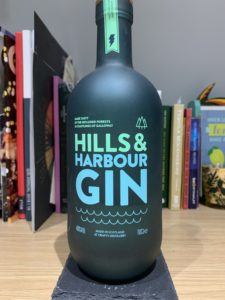 As you might have seen from previous posts, I am a big fan of Scotland and last year supported International Scottish Gin Day in August. One of the new(ish) gins coming from Scotland is Hills & Harbour gin. Hailing from Galloway (down by the border, the area is home to Gretna Green), they have a simple premise – make a gin for everyone, not just the gin snobs. This promise means they won’t charge you a month’s salary to buy a bottle (although at £40 it is definitely not the cheapest), and they won’t use poncy jargon or trendy botanicals. Using local grains, they make their own wheat base spirit as they believe this is key to the best flavour. They use 11 botanicals including Noble Fir needles (the Hills) and Bladderwrack seaweed (the Harbour) from the local area, they say the gin is juniper forward with hints of tropical fruit, citrus and “a subtle scent of the shore”. So, how does it taste?
As you might have seen from previous posts, I am a big fan of Scotland and last year supported International Scottish Gin Day in August. One of the new(ish) gins coming from Scotland is Hills & Harbour gin. Hailing from Galloway (down by the border, the area is home to Gretna Green), they have a simple premise – make a gin for everyone, not just the gin snobs. This promise means they won’t charge you a month’s salary to buy a bottle (although at £40 it is definitely not the cheapest), and they won’t use poncy jargon or trendy botanicals. Using local grains, they make their own wheat base spirit as they believe this is key to the best flavour. They use 11 botanicals including Noble Fir needles (the Hills) and Bladderwrack seaweed (the Harbour) from the local area, they say the gin is juniper forward with hints of tropical fruit, citrus and “a subtle scent of the shore”. So, how does it taste?
Gwyr Bara Brith gin
Note: The team at Gwyr kindly sent me a bottle of Bara Brith to complete the set, but as always I’ll let you know what I think.
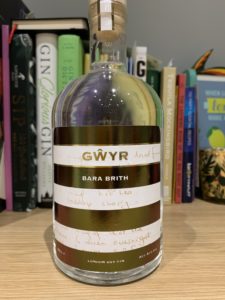 Readers of the blog will know that I am a big fan of team Gower Gin. I’ve already sipped on their Original gin, seasonal Pinwydd, and Rhosili gins, and today we try their latest addition: Bara Brith. What is Bara Brith you ask? Sometimes known as ‘speckled bread’, it is a mixture of dried fruits, brown sugar, spices and black tea, and this gin is inspired by their grandmother’s own recipe. This recipe is reproduced on their signature striped labels, and included with every order inside the reusable muslin bag. They soak the fruit in warm tea with fresh citrus, ginger, nutmeg and cinnamon before distilling it and they suggest serving it with ginger ale or with tonic and a slice of lemon.
Readers of the blog will know that I am a big fan of team Gower Gin. I’ve already sipped on their Original gin, seasonal Pinwydd, and Rhosili gins, and today we try their latest addition: Bara Brith. What is Bara Brith you ask? Sometimes known as ‘speckled bread’, it is a mixture of dried fruits, brown sugar, spices and black tea, and this gin is inspired by their grandmother’s own recipe. This recipe is reproduced on their signature striped labels, and included with every order inside the reusable muslin bag. They soak the fruit in warm tea with fresh citrus, ginger, nutmeg and cinnamon before distilling it and they suggest serving it with ginger ale or with tonic and a slice of lemon.
Copperfield A Christmas Carol gin
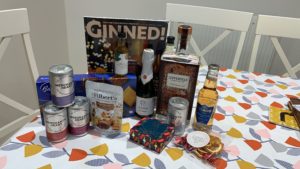 December is a tricky time – well, by tricky I mean I get my Craft Gin Club delivery and because it’s Ginvent I don’t get to open my delivery until later in the month. This month we got a bumper box: four cans of Merchant’s Heart tonic, festive nuts, Pedrino sherry and tonic spritz, a bottle of cava, biscuits, winter tea, and the main event – Copperfield A Christmas Carol gin. Distilled in the Surrey hills, husband and wife team Chris and Katherine (who between them have a degree in biochemistry and chemical engineering, and a PhD in brewing and distilling) were left home alone after their children grew up and decided it was time to set up their distillery. Inspired by the classic books collected by Katherine, and named after a legendary policeman in their village, the Surrey Copper Distillery was born.
December is a tricky time – well, by tricky I mean I get my Craft Gin Club delivery and because it’s Ginvent I don’t get to open my delivery until later in the month. This month we got a bumper box: four cans of Merchant’s Heart tonic, festive nuts, Pedrino sherry and tonic spritz, a bottle of cava, biscuits, winter tea, and the main event – Copperfield A Christmas Carol gin. Distilled in the Surrey hills, husband and wife team Chris and Katherine (who between them have a degree in biochemistry and chemical engineering, and a PhD in brewing and distilling) were left home alone after their children grew up and decided it was time to set up their distillery. Inspired by the classic books collected by Katherine, and named after a legendary policeman in their village, the Surrey Copper Distillery was born. 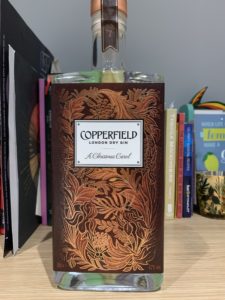 Going full steam ahead, they designed a spirit lab and distillery, ordered two 2 litre and one 20 litre copper pot stills for their gin, plus a second 20 litre still for their vermouth. All are named after literary characters – Tweedle Dee and Tweedle Dum, Alice, and Wendy (Darling), and their branding is an homage to illustrations on antique book covers. Their original London dry gin uses – you guessed it – a historical recipe found in a library archive of pink peppercorns, cubeb berries, rose petals, hibiscus and elderflower. This time we are trying their Christmas gin exclusive to Craft Gin Club members which focuses on cloves, cinnamon, star anise, orange, rosemary and sage. So, how does it taste?
Going full steam ahead, they designed a spirit lab and distillery, ordered two 2 litre and one 20 litre copper pot stills for their gin, plus a second 20 litre still for their vermouth. All are named after literary characters – Tweedle Dee and Tweedle Dum, Alice, and Wendy (Darling), and their branding is an homage to illustrations on antique book covers. Their original London dry gin uses – you guessed it – a historical recipe found in a library archive of pink peppercorns, cubeb berries, rose petals, hibiscus and elderflower. This time we are trying their Christmas gin exclusive to Craft Gin Club members which focuses on cloves, cinnamon, star anise, orange, rosemary and sage. So, how does it taste?
Ginvent 2019 – Juniper cubed gin
One of the highlights every year in Ginvent is seeing what Emile and Olivier come up with as their own Ginvent gin. This year, they decided juniper was the way forward. Lots and lots of juniper. Using 200 litres of various gins as a base, they then redistilled this with three types of juniper (hence, Juniper Cubed). From the Mediterranean we have juniper communis, juniper phoenicea from the Spanish island of Formentera, and finally the Africa juniper procera. It seems fitting to end this year’s Ginvent with a mountain of juniper, so let’s give it a taste.
Ginvent 2019 – Manly Australian Dry gin
Note: This post contains affiliate links marked as [Ad], if you click on this and buy a bottle of gin then I will receive a small commission.
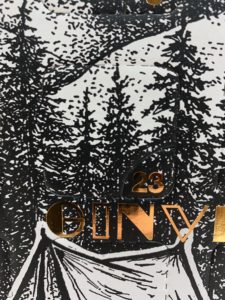
Well, we’ve nearly made it. Just two days left to go and after four gins from South East Asia, we travel even further afield to the east coast of Australia. Manly Spirits burst onto the scene in April 2017, but I feel like 2019 was their year here in the UK. I had already tried their Coastal Citrus gin earlier this year and then I met them at Junipalooza and got a quick tasting of this edition (which was filmed for their Instagram and not at all embarrassing). Their Australian Dry gin uses native botanicals sea lettuce, anise myrtle, orange peel, pepper leaf and finger limes and they say this brings fruity peppery notes to the gin. It’s worth noting that in the two and a half years since launching, they have not just those two gins, but also the new Lilly Pilly Pink gin and a barrel aged gin and two vodkas and a limoncello AND a coffee liqueur. So, they’ve been pretty busy. But have they put quantity over quality? Let’s find out!
